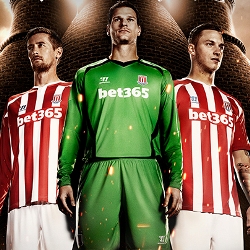Calls for Gambling Site Advertising Ban on Soccer Shirts

A Christian charity organization called CARE has lent its support to the Labour Party, whose deputy leader Tom Watson recently signaled a change in their liberal attitude towards gambling advertising if his party was ever elected to government in the UK. More specifically, they believe that gambling companies and their sites should be banned from advertising their logos on football shirts, with the Labour Party insisting that it was wrong to bombard young, impressionable minds, and those people below the legal gambling age of 18.
Tom Watson made his dramatic comment after a report was released stating that out of a population of 65 million people, the UK has 2 million people at risk of addiction, including 430,000 who have already developed a gambling problem. As he subsequently stated:
“There needs to be massive reform, we’ve got a gambling industry that spends many millions of pounds lobbying ministers, journalists, civil servants, on the message that they believe in responsible gambling, and what we’ve seen today is irresponsible gambling. We are not going run away from this, we are going to be demanding that the government take this hidden crisis seriously.”
Soccer Sponsorship
Many of the reforms implemented in the UK were as a result of Labour’s 2005 Gambling Act, which helped make the industry fit for a new digital age. The gambling market has since expanded exponentially in the country, and currently its national sport of soccer has 9 out 20 Premier League teams sporting the logos of gambling firms, as well as 25 out of the 92 league clubs based in the UK. These include such gambling companies as Betway, SportPesa, ManBetX, Dafabetand,and Bet365.
As a result, CARE has stated that football needs to play a role in minimizing the often-overlooked “epidemic” of gambling addiction in the country by not normalizing it to a young audience. According to the charity, however, the present situation related to shirt sponsorship sends a message that football clubs are not taking this problem seriously, and are instead promoting easier access to gambling for vulnerable people.
Furthermore, gambling firm logos are not just seen at live matches, and are also shown in the highlights segments of broadcasts on the BBC, as well as commercial television stations. Commenting on the situation, Dr Dan Boucher, CARE’s Director of Parliamentary Affairs, stated:
“Betting ads on sports shirts are irresponsible – it normalizes gambling to a very young audience. Shown completely without context, these shirts are on the backs of children’s sports heroes and create the illusion that gambling is harmless, fun and without consequences. We know that is not the case. There has been a trebling in problem gambling amongst 18-24 year olds.”
Past Lessons
Companies who sold tobacco were eventually prohibited from advertising their products at sporting events in the UK, or putting their logos and company names on branded items on account of the harm associated with smoking. The process was a slow one, though, with the first call to have cigarette advertising on TV banned coming in 1962, leading to a TV commercial ban in 1965, a health warnings placed on cigarette packets in 1971, and a cigars and loose tobacco commercial ban in 1991. Twenty years would then elapse before a tobacco vending machine ban was introduced in England in 2011, in order to further reduce under-age tobacco sales to children, and to help those adults looking to quit.
Similarly, anti- gambling groups are now promoting the idea that gambling company advertising should be removed from soccer shirts, which the Christian charity explains would represent a positive step toward supporting people at risk from addiction in the UK, instead of encouraging them.
A spokesperson for CARE also cited the example of the Football Association (FA), which this year halted its commercial contract with Ladbrokes following a well-publicized case involving Burnley midfielder Joey Barton and the FA. The player was given a ban by the organization for breaching the organization’s rules and betting on matches, with Barton then accusing the FA of double standards considering its commercial relationship with Ladbrokes. In the end, the FA accepted that partnering with a company that promotes gambling was not an appropriate example to set, and at the end of the 2016-17 broke off its its £4 million-a-year deal with the operator.










